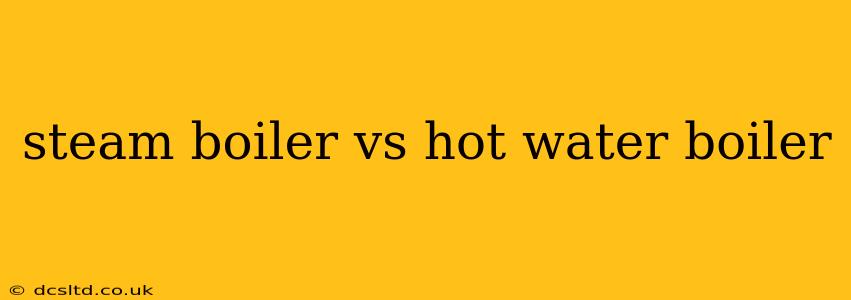Choosing between a steam boiler and a hot water boiler is a crucial decision for any building requiring a central heating system. Both systems effectively distribute heat, but they operate differently, impacting efficiency, cost, and suitability for specific applications. This comprehensive guide explores the key differences to help you make an informed choice.
What is a Steam Boiler?
A steam boiler heats water to the point of vaporization, creating steam under pressure. This high-pressure steam is then circulated through pipes to radiators or other heat exchangers, releasing its heat as it condenses back into water. Steam boilers are known for their ability to deliver intense heat quickly, making them suitable for applications requiring rapid heating.
What is a Hot Water Boiler?
A hot water boiler, on the other hand, heats water to a high temperature (but below boiling point) and circulates it directly through a system of pipes and radiators. The heated water transfers its heat to the surrounding environment as it circulates, then returns to the boiler to be reheated. Hot water boilers generally operate at lower pressures than steam boilers.
Steam Boiler vs. Hot Water Boiler: Key Differences
This section delves into the key distinctions between steam and hot water boilers, addressing common questions and concerns.
1. Heat Transfer Efficiency:
Steam boilers: Offer rapid heat transfer due to the latent heat of vaporization released as steam condenses. This makes them ideal for situations requiring fast heating and high heat output. However, some heat is lost during the steam generation and condensation process.
Hot Water boilers: Provide a consistent and even heat distribution. Although the initial heating may be slower, hot water systems generally exhibit higher overall efficiency due to reduced heat loss during the heating cycle.
2. Operating Pressure:
Steam boilers: Operate under significantly higher pressure than hot water boilers, demanding robust safety features and more stringent maintenance requirements.
Hot Water boilers: Operate at much lower pressures, resulting in simpler designs and potentially lower maintenance costs.
3. Maintenance and Repair:
Steam boilers: Require more frequent and specialized maintenance due to the higher operating pressure and the complexity of steam-related components. Leak detection and repair can be more challenging and time-consuming.
Hot Water boilers: Typically require less frequent maintenance and are generally simpler to repair. Parts are often more readily available, and repairs are less complex.
4. Initial Cost:
Steam boilers: Generally have higher initial installation costs due to the more complex design and the need for specialized components, such as pressure relief valves and traps.
Hot Water boilers: Usually have lower upfront installation costs compared to steam boilers.
5. Operating Costs:
Steam boilers: Can have higher operating costs due to the energy consumed during steam generation and the potential for higher heat loss.
Hot Water boilers: Typically have lower operating costs due to higher efficiency and lower energy consumption.
6. Applications:
Steam boilers: Are often preferred in large industrial settings, commercial laundries, and certain manufacturing processes where rapid and intense heat is required. They are less common in residential settings.
Hot Water boilers: Are commonly used in residential buildings, smaller commercial spaces, and applications where even and consistent heating is preferred over rapid heat delivery.
7. Temperature Control:
Steam boilers: Maintaining precise temperature control can be more challenging due to the nature of steam's heat transfer.
Hot Water boilers: Offer more precise and consistent temperature control, resulting in greater comfort and better energy management.
8. System Size & Complexity:
Steam boilers: Often require larger and more complex systems due to the need for steam traps, pressure regulators, and other specialized components.
Hot Water boilers: Generally result in simpler and less complex systems with fewer components, simplifying installation and maintenance.
Which Boiler is Right for You?
The best choice between a steam boiler and a hot water boiler depends entirely on your specific needs and circumstances. Consider the following factors:
- Building size and type: Hot water boilers are better suited for smaller buildings and residential applications. Larger buildings, commercial establishments, and industrial facilities might benefit from steam boilers.
- Heating requirements: Steam boilers provide intense heat quickly, whereas hot water boilers offer consistent, even heating.
- Budget: Hot water boilers tend to have lower upfront costs, but both may have comparable operating costs depending on efficiency and usage.
- Maintenance capabilities: Consider the expertise needed for maintenance and repair; hot water boilers typically require less specialized maintenance.
By carefully weighing these factors, you can choose the boiler system that best meets your heating needs, budget, and long-term operational requirements. Consulting with a qualified HVAC professional is highly recommended for personalized advice.
